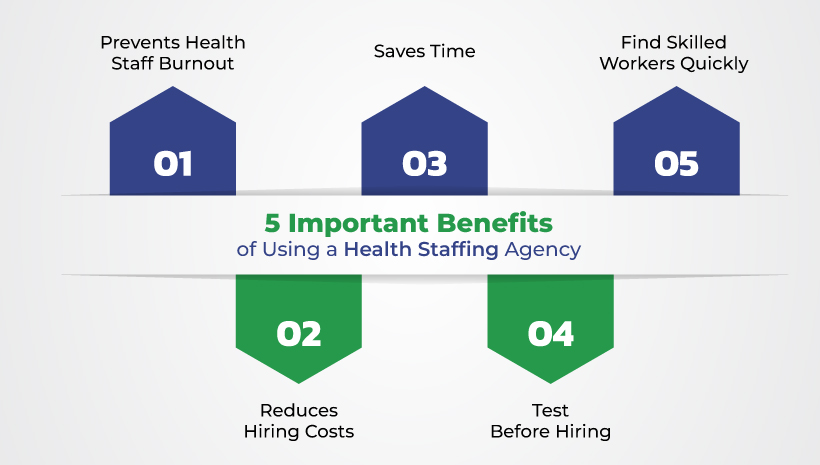A health staffing agency is a specialized employment service that connects healthcare employers with qualified medical professionals.
These agencies play a crucial role in ensuring that hospitals, clinics, and other healthcare facilities have the staff they need to provide quality patient care. In many developed countries, both private businesses and government-funded agencies offer healthcare staffing services.

Private health staffing agencies help hospitals, nursing homes, and other medical institutions find healthcare professionals, while public health employment agencies assist in filling essential medical positions through government support.
What Do Health Staffing Agencies Do?
Health staffing agencies recruit and place healthcare professionals in various roles, including temporary, part-time, or full-time positions.
These agencies are also known as medical staffing firms or healthcare recruitment agencies. They provide staffing solutions for nurses, doctors, therapists, medical assistants, and other healthcare workers.
How Do Health Staffing Agencies Work?
A health staffing agency assists both healthcare professionals seeking jobs and medical facilities in need of staff.
These agencies manage the hiring process, ensuring that healthcare providers find skilled professionals while also handling contracts and payroll. Some agencies specialize in specific fields, such as nursing, physical therapy, or telemedicine.
How the Process Works:
Healthcare Employers Contact the Agency
- Hospitals, clinics, or nursing homes reach out to a health staffing agency for workforce needs.
- They share job details, such as required qualifications, shifts, salary, and contract duration.
- The agency prepares a job description and advertises the vacancy.
Healthcare Professionals Apply
- Nurses, doctors, therapists, and other medical professionals apply for positions through the agency.
- Recruiters may assess their qualifications, certifications, and work experience.
- The agency reviews applications and matches candidates with suitable healthcare facilities.
Interviews and Credential Verification
- The staffing agency verifies medical licenses and certifications to ensure compliance with healthcare regulations.
- Some employers may conduct additional interviews before making a hiring decision.
- The employer selects the most suitable candidate for the role.
Contracts and Payroll Management
- The staffing agency manages contracts and legal paperwork.
- In temporary or travel healthcare positions, the agency may handle payroll and benefits.
- If a healthcare facility wants to hire a temporary worker permanently, the agency facilitates the transition.
For career paths beyond correctional facilities, discover 5 Best Ways to Enhance Physician Well-being to maintain work-life balance in the field.
Do Staffing Agencies Charge Fees?
- Employers pay the agency for hiring services.
- Job seekers do not have to pay the agency.
- The company pays extra costs, such as:
- Markups (extra charges added to wages, usually 25% to 100%).
- One-time fees for permanent hires.
Contract buyouts if a company wants to keep a temporary worker.
Guidelines for Collaborating with a Staffing Agency
- Pick the right agency – Choose one that specializes in your field.
- Be professional – Dress well and be on time for interviews.
- Be clear – Tell them your job preferences, expected pay, and location.
- Be honest – Explain any gaps in your work history.
- Learn new skills – Some agencies offer free training.
- Consider different jobs – Temporary work may lead to full-time opportunities.
- Apply in multiple places – Don’t rely only on one agency; try job boards and networking too.
5 Important Benefits of Using a Health Staffing Agency
Hiring new workers takes a lot of time and money.
Hiring healthcare professionals can be time-consuming and expensive. Health staffing agencies help medical facilities quickly find qualified professionals, reducing the hiring burden. These agencies provide temporary, part-time, and full-time healthcare workers, ensuring that hospitals and clinics maintain high-quality patient care without staffing shortages.

To improve job matching, many agencies now use Text Analysis for Job Matching Quality Improvement. This helps them better understand job descriptions and match job seekers with the best opportunities, making hiring faster and more accurate.
Why Use a Staffing Agency?
1. Prevents Healthcare Staff Burnout
When a hospital or clinic is shortstaffed, existing medical professionals must work longer hours, leading to stress and fatigue. Temporary healthcare workers help reduce this burden until permanent staff are hired.
Example: A hospital’s ICU is short on nurses due to an unexpected flu outbreak. Instead of overworking existing staff, a health staffing agency provides temporary ICU nurses to maintain patient safety and care quality.
2. Reduces Hiring Costs
Hiring full-time medical staff comes with expenses like salaries, benefits, and training. Health staffing agencies help reduce costs by providing skilled temporary or contract-based professionals.
Businesses can save money on:
- Salaries and benefits (temporary healthcare workers don’t require full-time benefits)
- Training costs (agencies provide pre-trained professionals)
- Overtime pay (additional workers reduce the need for overtime shifts)
Also, hospitals and clinics don’t have to pay unemployment benefits when a temporary assignment ends.
3. Saves Time
Hiring can take weeks or months. A staffing agency makes it faster and easier by doing the hard work for the company.
Example: A jewelry store needs extra workers for Valentine’s Day sales. Instead of searching for workers on their own, they call a staffing agency. The agency quickly finds a cashier with jewelry sales experience.
4. Lets You Test Workers Before Hiring Them
Sometimes, companies aren’t sure if a worker is the right fit. A staffing agency lets them try workers before hiring them full-time.
- Companies can see how well a worker does before making a long-term decision.
- They can get feedback from their team about the new worker.
- If the worker is a good fit, they can hire them full-time.
5. Finds Skilled Workers Quickly
Staffing agencies have large networks of skilled workers. They help businesses find the right employees faster than hiring on their own. Many job seekers choose a recruitment agency for new job vacancies based on important factors.
These include how quickly the agency finds jobs, the types of companies they work with, and the support they provide during the hiring process.
Understanding the Recruitment Process
Recruitment is a structured process that organizations follow to attract, assess, and hire the right candidates for open positions. A well-defined recruitment process ensures efficiency, consistency, and the selection of top talent while aligning with business goals.
Steps Involved in Recruitment
- Identifying Hiring Needs
- Organizations assess workforce requirements and define the skills and experience necessary for the role.
- Job roles are created or updated based on business demands and future growth plans.
- Job Description and Posting
- A well-drafted job description outlines responsibilities, qualifications, and expectations.
- Job postings are shared across various platforms like job boards, company websites, and social media.
- Sourcing Candidates
- Employers use multiple channels, such as LinkedIn, job fairs, referrals, and recruitment agencies, to find potential candidates.
- AI-driven hiring tools and databases are also used to streamline sourcing.
- Application and Initial Screening
- Candidates submit resumes, cover letters, or application forms.
- HR professionals or automated tools scan applications for basic qualifications and experience.
Screening and Shortlisting Candidates
- Resume Screening
- HR teams or Applicant Tracking Systems (ATS) filter applications based on predefined keywords and job requirements.
- Only candidates who meet the core job criteria proceed to the next step.
- Preliminary Interviews
- A short telephonic or video interview is conducted to assess communication skills, motivation, and basic job fit.
- Employers may ask about salary expectations, availability, and work history.
- Shortlisting Candidates
- Candidates who successfully pass the initial interview are shortlisted for further assessments.
- Hiring teams may consider factors like experience, education, certifications, and cultural fit.
Interview Process and Skill Assessments
- Technical and Behavioral Interviews
- Candidates undergo structured interviews focusing on job-specific knowledge, problem-solving skills, and past work experiences.
- Behavioral questions based on the STAR (Situation, Task, Action, Result) method assess problem-solving, leadership, and adaptability.
- Skill Assessments and Tests
- Depending on the role, candidates may need to complete tests, such as coding assessments, writing samples, or logical reasoning tests.
- Psychometric tests may be used to evaluate personality traits and cognitive abilities.
- Final Interview and Decision-Making
- Senior managers or department heads conduct final interviews to assess cultural fit and decision-making capabilities.
- A final discussion on salary, benefits, and job expectations takes place before making an offer.
- Job Offer and Onboarding
- Successful candidates receive offer letters detailing salary, benefits, and joining conditions.
- The onboarding process begins with orientation, documentation, and training to ensure a smooth transition into the company.
Learn more about the key qualifications required for similar roles in What Are the Key Requirements of a Psychiatrist at the Department of State Hospitals-Atascadero?
Final Checklist: Your Path to a Thriving Staffing Agency
Starting a staffing agency takes careful planning.
You need to follow both federal and state regulations to ensure your business runs smoothly. Key documents like an Employer Identification Number, business license, and state tax ID are essential.
Forgetting any of these could lead to delays or penalties, so it’s always a good idea to double-check everything before moving forward.
In addition to legal paperwork, having a solid business plan and a non-disclosure agreement will help set a strong foundation for your agency. These documents not only guide your business strategy but also protect your interests.
While the process may seem overwhelming at first, don’t let it hold you back.
The healthcare staffing agency industry is growing rapidly, creating exciting opportunities for new businesses. With careful planning, dedication, and hard work, you can build a thriving agency. Wishing you success on your journey!
FAQs About Staffing Agency Applications
Is the agency a specialist in my industry?
Understanding whether the agency specializes in your field can help determine if they have the necessary expertise and connections to find suitable opportunities for you.
Does the health staffing agency hold any professional accreditations?
Accreditations can indicate the agency’s credibility and adherence to industry standards.
How does getting hired through a staffing agency work?
Clarify the process from initial contact to placement to understand the steps involved and what to expect at each stage.
What do clients look for when hiring a staffing agency?
Understanding what employers seek in a staffing agency can provide insight into the agency’s strengths and how they meet client expectations.
How do staffing agencies find candidates?
Inquiring about their sourcing methods, such as utilizing job boards, networking, or internal databases, can give you an idea of their reach and effectiveness in finding suitable candidates.

